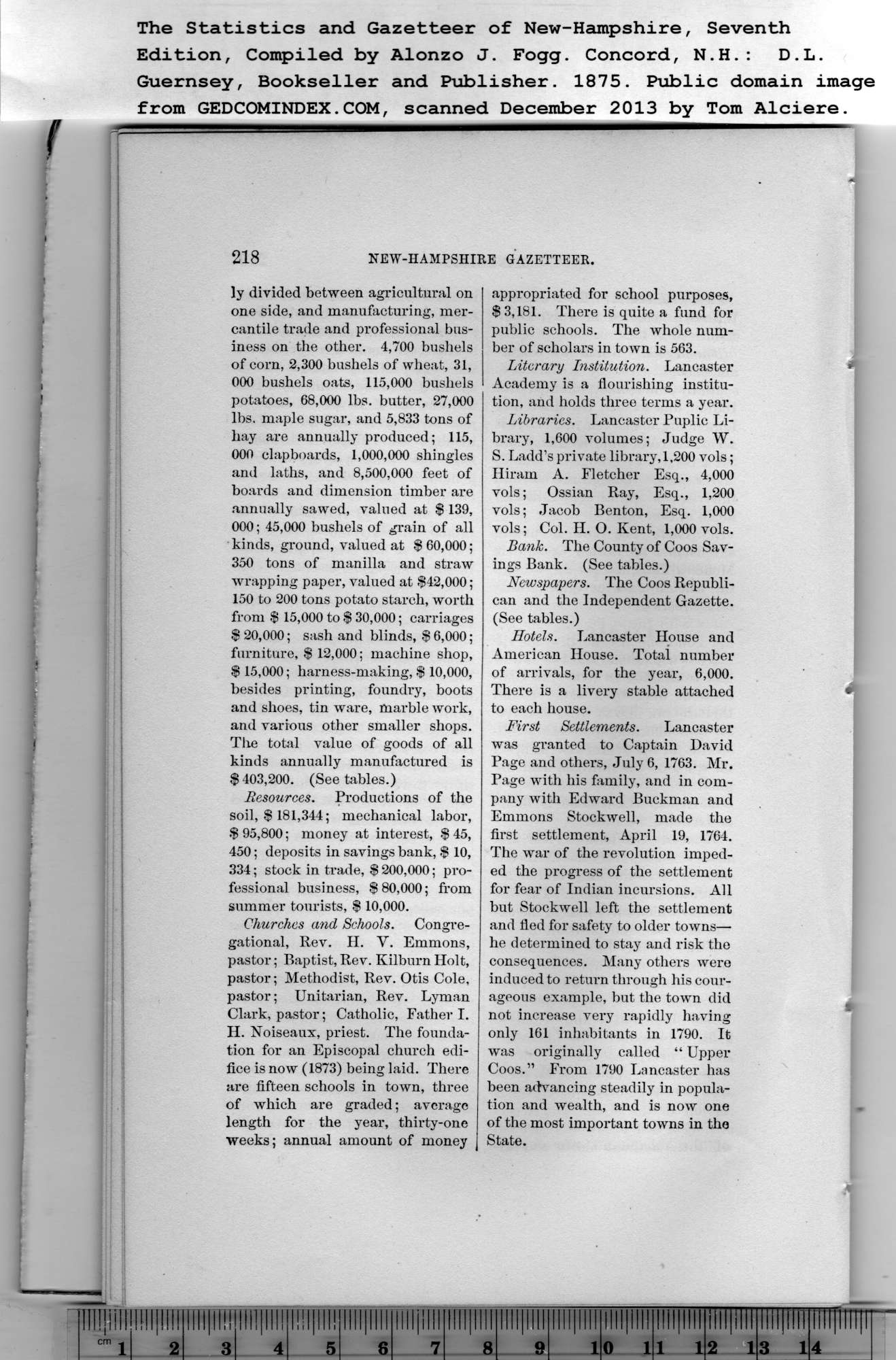|
ly divided between agricultural on
one side, and manufacturing, mer-
cantile trade and professional bus-
iness on the other. 4,700 bushels
of corn, 2,300 bushels of wheat, 31,
000 bushels oats, 115,000 bushels
potatoes, 68,000 lbs. butter, 27,000
lbs. maple sugar, and 5,833 tons of
hay are annually produced; 115,
000 clapboards, 1,000,000 shingles
and laths, and 8,500,000 feet of
boards and dimension timber are
annually sawed, valued at $ 139,
000 ; 45,000 bushels of grain of all
kinds, ground, valued at $ 60,000;
350 tons of manilla and straw
wrapping paper, valued at $42,000;
150 to 200 tons potato starch, worth
from $ 15,000 to $ 30,000; carriages
$ 20,000; sash and blinds, $ 6,000;
furniture, $ 12,000; machine shop,
$ 15,000; harness-making, $ 10,000,
besides printing, foundry, boots
and shoes, tin ware, marble work,
and various other smaller shops.
The total value of goods of all
kinds annually manufactured is
$403,200. (See tables.)
Resources. Productions of the
soil, $ 181,344; mechanical labor,
$ 95,800; money at interest, $ 45,
450; deposits in savings bank, $ 10,
334; stock in trade, $ 200,000; pro-
fessional business, $ 80,000; from
summer tourists, $ 10,000.
Churches and Schools. Congre-
gational, Rev. H. V. Emmons,
pastor; Baptist, Rev. Kilburn Holt,
pastor; Methodist, Rev. Otis Cole,
pastor; Unitarian, Rev. Lyman
Clark, pastor; Catholic, Father I.
H. Noiseaux, priest. The founda-
tion for an Episcopal church edi-
fice is now (1873) being laid. There
are fifteen schools in town, three
of which are graded; average
length for the year, thirty-one
weeks; annual amount of money
appropriated for school purposes,
$3,181. There is quite a fund for
public schools. The whole num-
ber of scholars in town is 563. |
Literary Institution. Lancaster
Academy is a flourishing institu-
tion, and holds three terms a year.
Libraries. Lancaster Puplic Li-
brary, 1,600 volumes; Judge W.
S. Ladd’s private library, 1,200 vols;
Hiram A. Fletcher Esq., 4,000
vols; Ossian Ray, Esq., 1,200
vols; Jacob Benton, Esq. 1,000
vols; Col. H. O. Kent, 1,000 vols.
Bank. The County of Coos Sav-
ings Bank. (See tables.)
Newspapers. The Coos Republi-
can and the Independent Gazette.
(See tables.)
Hotels. Lancaster House and
American House. Total number
of arrivals, for the year, 6,000.
There is a livery stable attached
to each house.
First Settlements. Lancaster
was granted to Captain David
Page and others, July 6, 1763. Mr.
Page with his family, and in com-
pany with Edward Buckman and
Emmons Stockwell, made the
first settlement, April 19, 1764.
The war of the revolution imped-
ed the progress of the settlement
for fear of Indian incursions. All
hut Stockwell left the settlement
and lied for safety to older towns—
he determined to stay and risk the
consequences. Many others were
induced to return through his cour-
ageous example, hut the town did
not increase very rapidly having
only 161 inhabitants in 1790. It
was originally called “ Upper
Coos.” From 1790 Lancaster has
been advancing steadily in popula-
tion and wealth, and is now one
of the most important towns in the
State. |
